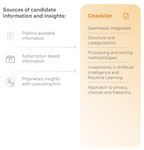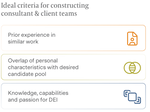Evaluating Candidate Databases
Most search firms have an ever-expanding database of individuals, driven by the explosion in computing power and the availability of data and information. These are complemented by public databases and subscription-based databases. True differentiation comes from the connectivity between these data pools and from deploying intelligent processing tools (increasingly, artificial intelligence and machine learning), and distilling the information into insights that add value in a search—without compromising individual privacy, choices and freedoms.
Every client should test their consulting firm’s practices and capabilities in candidate database management (or their own, if not using a consulting firm), especially the quality and resilience of the search and sorting engines. How is the power of the data channeled to serve you, the client?
Candidate Databases

The Impact of Candidate Access and Consulting Firm Culture
Distinctive candidate access goes beyond the ability to reach a candidate to differentiated non-public insights about candidates that can only come from the credibility, intimacy and trust that has been built up over time by individual consultants within a firm. The ability to share that access with their colleagues and clients in the most value-enhancing and responsible way is what makes the difference between knowing of a candidate and being able to bring them to the table to discuss an opportunity.
Previous experience can be a double-edged sword. Using a firm that has done similar work before allows for differentiated access to the talent pool for a particular search as well as a deeper understanding of “best in class” clients, candidates and trends for a particular role. On the flip side, having strong credentials can create an “off-limits” issue—a firm not being able to access a particular leader or set of leaders because a prior or ongoing business relationship prohibits this access.
Equally important is the culture of collaboration within the consulting firm, which is often linked to its financial plumbing. How do consultants get paid, in terms of commissions linked to assignments and overall profit sharing, and what tensions might this create in terms of their willingness and enthusiasm to collaborate? Clients must recognize the impacts of culture and systems on candidate access.
Candidate Access & Consulting Firm Culture

Consultant Team Composition and DEI Sensitization
In addition to prior experiences, two further factors should drive team composition:
Personal characteristics of the individuals on the consulting team.
Research has shown that access to and acceptance into networks that share a certain characteristic (e.g., gender, ethnicity, sexuality, disability, age, socioeconomics, national identity, regional identity, religious identity, etc.) is positively correlated to possessing that characteristic yourself. The term for this in sociology is homophily, which is the tendency of people to seek out those who are similar to themselves, more than they would typically seek out those who are not similar.
If you are looking to enhance access to and relatability with a particular underrepresented candidate pool, having members of the consulting team who share that characteristic could be beneficial. Though research on this is at an early stage, current Egon Zehnder analysis shows that female consultants on average end up presenting more female candidates for interviews than male consultants do. Searches led by female consultants outperformed searches led by male consultants by 25 percent in terms of presenting at least one female candidate to the interview stage across the firms’ global searches.
Nature & Nurture

Personal values, viewpoints and intellectual curiosity of the consultants
Those who engage seriously in the DEI dialogue irrespective of their personal characteristics seem to fare better in the diversity of hiring outcomes. Current Egon Zehnder analysis has found a positive correlation between engagement in DEI knowledge, language, capabilities and participation and a higher proportion of diverse hires. Consultants who are designated as DEI champions made 20 percent more female candidate hires than the wider consultant pool, irrespective of their gender.
The ideal team composition is one that has sufficient experience, the desired personal characteristics, and sincere passion, knowledge and capabilities in DEI.
The DEI conversations of the future will require more nuance and an ability to handle greater complexity. Over time, diversity definitions will move beyond thematic asks on gender, ethnicity and sexual orientation toward more comprehensive and inclusive approaches and definitions. No individual consultant could hope to have personal characteristics to match those definitions.

Client Team Composition
Egon Zehnder analysis shows that if more than 40 percent of the client team is female, there is a 40 percent or more chance of there being a female hire on the project. The sweet spot seems to be a client team that is 40-60 percent female, which roughly equates to 47 percent female hires. (On the other hand, 80-100 percent female client teams equate to about 40 percent female hires, and 0-20 percent female client teams equate to 29 percent female hires.)
Client Team DEI Sensitization
Beyond the points made earlier about consultant team and client composition and DEI knowledge, which still apply here, additional factors come into play when the client hiring team is not diverse and does not have a successful track record of attracting and integrating diverse talent onto the team. In such a case, we’d recommend providing additional support to the client team and bringing different client voices (beyond those directly involved in the hiring decision) into the decision-making and influencing structures from the get-go.
There are two ways to structure this support:
- In the foreground (part of the interviewing, project management and decision-making process)
- In the background (in an advisory capacity)

The objective is to act as a bridge to deeper appreciation of diverse candidates, picking up on subtleties and bringing differentiated perspectives that may aid better decision-making and relationship-building, without hijacking the process.
Finally, it is worth emphasizing the advantages of pursuing DEI goals in a team construct. While team members will bring their individual biases, they are likely to be different from your own and could lead to better discussions and outcomes.
